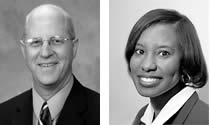ECU lands national spirituality and medicine grant
The Brody School of Medicine at East Carolina University has been awarded a $50,000 grant to complete a medical education project on spirituality and medicine.
The four-year grant awarded by the George Washington Institute for Spirituality and Health (GWish) to ECU is one of four national grants from the George Washington University-based group for 2005.

Musick (left), Hardy
Started in 1995, the “Curriculum Development in Spirituality and Medicine” grant is given to a medical or osteopathic school that incorporates issues related to spirituality and medicine into their curriculum, according to the GWish Web site.
At ECU, Dr. David Musick, associate dean for medical education, is the primary investigator with Dr. Virginia Hardy, associate dean for intercultural affairs, counseling and diversity, serving as co-principal investigator for the grant. Hardy is also interim senior associate dean for academic affairs.
“One of the things we’ll discuss with the students is taking a spiritual history of the patient, said Musick. “Obviously, it’s not for every patient situation, but if the patient has been just diagnosed with a chronic or terminal illness then they may lean on their spiritual resources. We believe physicians should be willing to speak to their patients about that, particularly with end-of-life issues.”
He added that national surveys show that patients want to speak to their physicians about their religious beliefs.
“Well use this grant funding to develop and implement a new set of skills as well as bring knowledge to the curriculum,” said Musick, who is also associate professor for physical medicine and rehabilitation. “And once you implement, you have to assess that the students have learned from it.”
Musick added that GWish awarded grant funding for spirituality and medicine development in medical school curriculums about a decade ago, but the courses didnt reach a large number of students since the courses were electives and only five or six out of 75 students might take the course.
“Now it is more the tapestry approach, which is what we will do. You take a little bit and put it here and there throughout the curriculum. You reach all of the students that way,” Musick said. “We went through a process putting this together and talking to all the course directors. We will add parts of this into 11 different sections of the curriculum.”
During the first two years of medical school, the course work focuses on the science of how the body works and how medications affect the body; the third and fourth year takes that knowledge into the clinical setting for training.
This is not the first time that Musick has served as principal investigator and received this award. “In the mid-90s while I was at the University of Kentucky, I was the co-principal investigator with a physician and we got this grant. I developed the curriculum so I think that will help me a lot here,” he said.
The Association of American Medical Colleges has included spirituality as a component of its Medical School Objectives Project Report III, a set of curriculum guidelines sent to all medical schools, according to GWish.
The George Washington Institute for Spirituality and Health works toward a more compassionate system of health care by restoring the heart and humanity of medicine through research, education and policy work focused on bringing increased attention to the spiritual needs of patients, families and the health care professionals, according to its Web site.